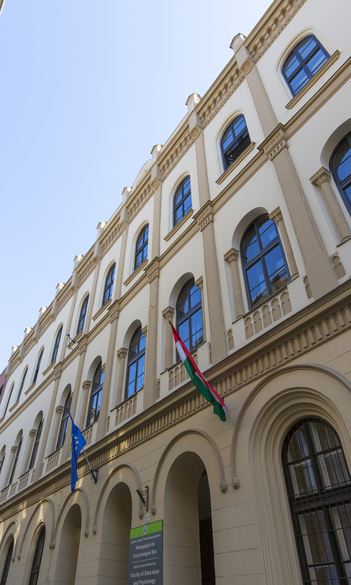Quality development
Minőségfejlesztés - Neveléstudományi Doktori Iskola
Quality development

Mission
The mission of the Doctoral School of Education (DSE) is to prepare its students through interdisciplinary doctoral programs in educational sciences for successful careers in higher education, academic research, and other sectors of education that demand high-level research competencies. The DSE aims to play a leading role in the training of educational researchers by fostering their independent research and development capacities, while also supporting the dissemination and practical application of research findings.
Vision
The vision of the Doctoral School of Education is to operate as an organizational unit closely integrated with the Faculty’s educational and research structure, with each doctoral program underpinned by a coherent research strategy that addresses existing societal challenges in education. To this end, the DSE continuously develops its training and research portfolio in alignment with global trends in educational research, and strengthens its methodological knowledge base through an eclectic approach. Its goal is to function as a knowledge hub recognized internationally for its sensitivity to educational problems and its commitment to high-quality research.
Core Principles of the NDI Quality Development Policy
In order to maintain and further develop the high-quality operation of the Doctoral School of Education at Eötvös Loránd University, a quality development policy has been established. This policy is based on relevant legislation, university and faculty regulations, as well as the Standards and Guidelines for Quality Assurance in the European Higher Education Area (ESG 2015).
The quality enhancement policy of the NDI is grounded in the following general principles:
- Continuous Quality Development: Ensuring and continuously improving quality is an integral part of the DSE’s operation. Our goal is to foster an organizational culture that supports quality.
- Comprehensive Toolbox: Quality development is implemented through a multifaceted system that includes regulatory, incentive-based, professional support, communication, and organizational components.
- Self-Assessment-Based Strategy: The strategic quality development plan is built on detailed self-assessments conducted at the program level and consolidated at the level of the Doctoral School.
- Regulations and Strategic Documents: The operational regulations of the NDI and their annexes, along with the doctoral regulations at faculty and university level, serve as the foundation for quality assurance practices.
- Consideration of Global and European Trends and Standards: Quality assurance and development are aligned with global and European trends in doctoral education, particularly the analyses and recommendations of the European University Association (EUA) and its Council for Doctoral Education (EUA-CDE), in accordance with ESG standards.
- Integration of Educational and Research Quality: Reflecting the dual nature of doctoral schools, the NDI simultaneously applies tools that support both educational and research quality.
- University and Faculty Frameworks: The quality assurance and development processes of the DSE are implemented within and aligned with the general quality assurance strategies and activities of ELTE and the Faculty of Education and Psychology (FEP).
- Gradual Development: The enhancement of quality tools and mechanisms is built on previously initiated processes and follows the principle of gradual development.
- Stakeholder Involvement: Particular emphasis is placed on engaging and collaborating with stakeholders in the domain of quality development.
- Support for All Relevant Processes: We support all organizational processes that can contribute to quality enhancement (e.g., internationalization, research ethics approval processes, student initiatives, program-level self-assessments, etc.).
NDI Quality Development Policy
Annex 1: Self-assessment Process and Evaluation Criteria
Annex 2: Guidelines for the Review of Doctoral Training Programs and the Launch of New Programs
Annex 3: Quality Assurance Guidelines for Supervision
Annex 4: Process of Supervisor Selection and Approval
Quality Objectives
2021–2022
- Processing of the HAC (Hungarian Accreditation Committee) report and identification of intervention points (completed)
2022–2023
- Update and publication of the admission procedure system (completed)
- Publication of the curriculum and course descriptions (completed)
- Regulation of the roles of internal and external supervisors (completed)
- Development of doctoral group services (completed: implementation of digital credit registration form; in progress)
2023–2024
- Review of the doctoral website and other communication platforms (completed)
- Update of regulatory documents (completed)
- Development of doctoral group services (completed: transition of the admission procedure to an electronic system; in progress)
2024–2025
- Revision of the Quality Development Policy of the Doctoral School (completed)
- Development of doctoral group services (completed: integration of the credit registration form and the semester report; in progress)
2025–2026
- Under discussion
Reports to the University Doctoral Council (in Hungarian)
Self-assessments (in Hungarian)
- 2020
- 2025 (under development)
Statistics
Admissions
| 2020 | 2021 | 2022 | 2023 | 2024 | 2025 | |||||||
| A | B | A | B | A | B | A | B | A | B | A | B | |
| Hungarian students | 46 | 38 | 48 | 27 | 36 | 24 | 45 | 35 | 30 | 24 | ||
| International students | 26 | 20 | 23 | 15 | 32 | 28 | 39 | 29 | 20 | 18 | ||
A – number of applicants
B – number of admitted students
Comprehensive Examinations
- 2020: 44 candidates / 40 passed (90.91%)
- 2021: 46 candidates / 46 passed (100%)
- 2022: 36 candidates / 33 passed (91.6%)
- 2023: 27 candidates / 25 passed (92.59%)
- 2024: 40 candidates / 37 passed (92.5%)
Completion of Studies (Absolutorium)
Legacy 3-year programme:
- Autumn 2020: 1 self-financed student
- Spring 2021: 2 self-financed students
New 2+2-year programme:
- Spring 2020: 12 students (4 with scholarship, 8 self-financed)
- Autumn 2020: 11 students (1 with scholarship, 10 self-financed)
- Spring 2021: 18 students (8 with scholarship, 10 self-financed)
- Autumn 2021: 5 students (1 with scholarship, 4 self-financed)
Degree Awards
- 2020: 20 candidates
- 2021: 13 candidates
- 2022: 16 candidates (13 summa cum laude, 3 cum laude)
- 2023: 22 candidates (17 summa cum laude, 4 cum laude, 1 rite)
- 2024: 29 candidates (26 summa cum laude, 2 cum laude, 1 rite)

